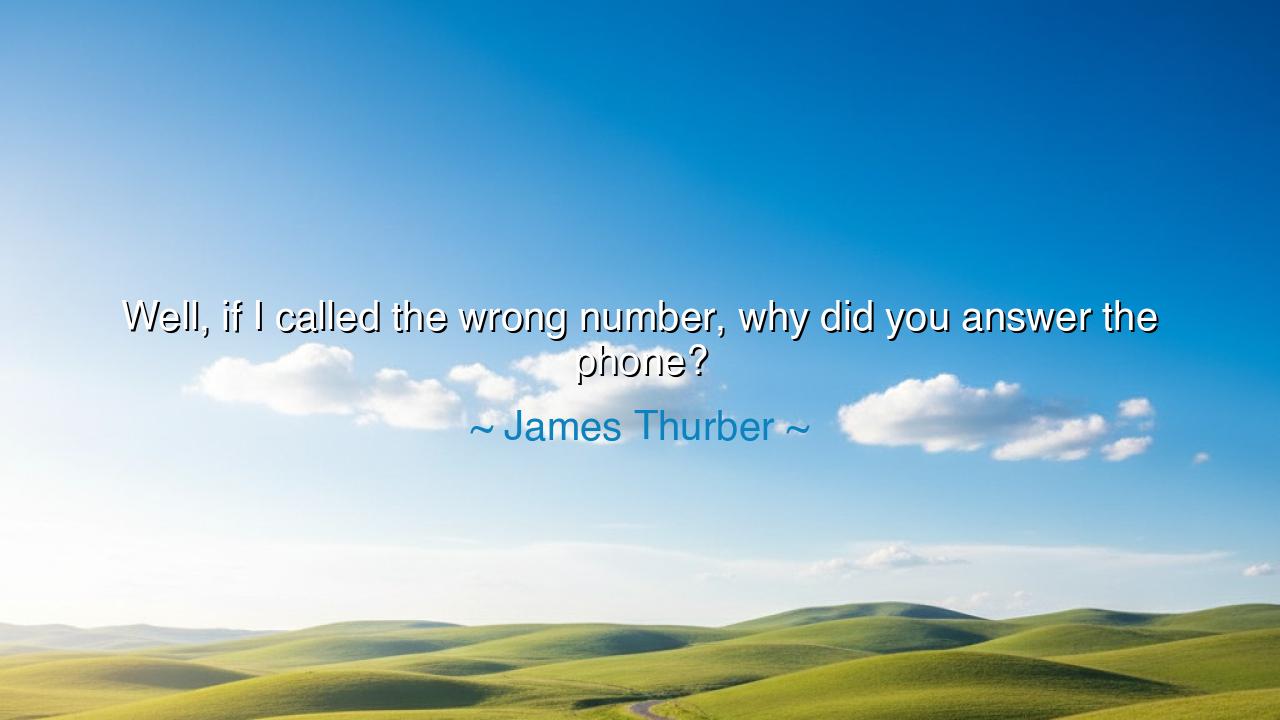
Well, if I called the wrong number, why did you answer the phone?






In the great drama of human existence, where misunderstanding and miscommunication often lead to confusion, there are moments when a simple, unexpected response reveals profound truths about our shared experience. James Thurber, known for his wit and sharp humor, once remarked, “Well, if I called the wrong number, why did you answer the phone?” In this seemingly playful statement, Thurber cuts through the layers of responsibility and blame, showing how, in life, the answer we give is as significant as the question that is asked. It speaks to the irony of human interaction, where the responsibility for a situation is not always as clear-cut as we would like it to be.
In the ancient world, questions and answers were often regarded as sacred exchanges, ones that required wisdom and discernment. The philosophers of Greece, like Socrates, believed that the very process of questioning was the path to knowledge. Socrates would question his interlocutors relentlessly, not to trap them, but to help them reach the deeper truths of their own minds. In the same way, Thurber’s playful remark speaks to the irony in our own assumptions about responsibility. Often, we ask questions expecting the answers to be clear and simple, but life, like the world of philosophy, reveals that the answers we seek are often not as straightforward as we expect. The question of who is responsible—whether for a mistake or for a situation—is a shared burden, as Thurber’s wit suggests.
Irony, like the one Thurber uses in this quote, is a powerful tool in literature and in life itself. Just as Shakespeare used irony to reveal the depths of human nature in works like Hamlet, Thurber's words reveal the complexity of human interaction and accountability. In this instance, Thurber subtly shifts the responsibility from the caller to the receiver, suggesting that we are all active participants in the situation, whether we intend to be or not. This mirrors the ancient concept of fate and free will: while we may believe that we are passive players, often the actions of others—and even the smallest decisions—shape the course of events. Just as Oedipus unwittingly brought about his own fate, the answer to a wrong number calls into question the role we each play in a given circumstance.
The story of the blind men and the elephant, an ancient Indian parable, serves as another example of how misunderstanding and perspective shape our experience. Each blind man, touching a different part of the elephant, describes the animal based on his limited viewpoint. To one, the elephant is like a wall, to another, like a rope, and to yet another, like a tree trunk. Each man, though truthful from his perspective, fails to understand the full picture. Similarly, in the world of human interactions, what may seem like a mistake—a wrong number dialed, a miscommunication—can often be traced to a deeper, shared misunderstanding of roles and expectations. Thurber’s quote, though comedic, points to a deeper truth: that we are all players in a drama where our roles are often unclear and shifting.
The lesson in Thurber’s words is one of self-awareness and accountability. When a mistake happens, our instinct may be to point fingers, to look for someone to blame. However, Thurber suggests that we should look beyond the obvious. If we call the wrong number, why does the other person pick up? The situation is a reflection of a shared responsibility, not a singular fault. Accountability is a shared quality, and it is through mutual reflection that we arrive at deeper understanding. The quote also speaks to the absurdity of life, where mistakes happen not because of malice but because of the unpredictable nature of human interaction. In a world full of complexity and chaos, the simple act of answering the phone can become a metaphor for human connection itself.
In our own lives, we can take this lesson to heart by embracing a holistic view of responsibility. It is easy to blame others when things go awry, to see ourselves as victims of fate or circumstance. However, by recognizing our part in the unfolding of events—whether it is the decision to answer the phone, to engage in a conversation, or to react in a certain way—we can take ownership of our actions. Life is not a simple exchange of questions and answers, but a complex web of choices, intentions, and perspectives. When we accept that responsibility is often shared, we create space for growth, compassion, and understanding.
The practical action we can take is to embrace responsibility not just for our own actions but for how we respond to the actions of others. Like Thurber’s playful reminder, we should reflect on how often we are passive players in situations that we perceive to be someone else’s fault. Instead of blaming, let us ask: What role did I play in this? This shift in perspective allows us to grow, to learn, and to build better connections. Accountability is not just about finding who is at fault, but about taking ownership of the shared experiences that define our relationships. Let us approach each interaction with humility and awareness, knowing that, like the blind men, we may not see the full picture but can still choose to understand it more deeply.






AAdministratorAdministrator
Welcome, honored guests. Please leave a comment, we will respond soon